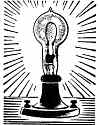|
Edison was hard at work experimenting on an important invention. In spite of numerous attempts he could not get the result he wanted. All his efforts failed. A sympathetic friend said to him, "It's too bad to do all of that work for nothing." "But it's not for nothing." said Edison. "We have got a lot of good results. Look now, we know 700 things that won't work."  A further illustration of this tenacity of purpose is demonstrated
by his search for the best filament material for his incandescent lamp.
For eighteen to twenty hours a day he experimented with all sorts of
materials - from human hair to plant fiber from the South Seas - until
one day he found that carbonized bamboo fiber gave the best results.
A further illustration of this tenacity of purpose is demonstrated
by his search for the best filament material for his incandescent lamp.
For eighteen to twenty hours a day he experimented with all sorts of
materials - from human hair to plant fiber from the South Seas - until
one day he found that carbonized bamboo fiber gave the best results.
Most people would have stopped there but not Edison - he had to find the best type of fiber. As one writer said, "He ransacked the earth from the Malay Peninsula to the jungles of the Amazon. He tried 6,000 varieties and it cost him over one hundred thousand dollars until he found the ideal type in the South American jungle." |








